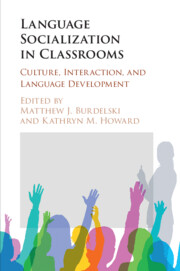Book contents
- Language Socialization in Classrooms
- Language Socialization in Classrooms
- Copyright page
- Dedication
- Contents
- Figures
- Tables
- Contributors
- Acknowledgments
- Transcription Conventions
- 1 Introduction
- Part I Socializing Values, Dispositions, and Stances
- Part II Socializing Identities
- Part III Language Socialization and Ideology
- 9 The Morning Assembly
- 10 Embodiment, Ritual, and Ideology in a Japanese-as-a-Heritage-Language Preschool Classroom
- 11 Talking about Lunch
- Part IV Conclusion
- Index
- References
9 - The Morning Assembly
Constructing Subjecthood, Authority, and Knowledge through Classroom Discourse in an Indian School
from Part III - Language Socialization and Ideology
Published online by Cambridge University Press: 10 February 2020
- Language Socialization in Classrooms
- Language Socialization in Classrooms
- Copyright page
- Dedication
- Contents
- Figures
- Tables
- Contributors
- Acknowledgments
- Transcription Conventions
- 1 Introduction
- Part I Socializing Values, Dispositions, and Stances
- Part II Socializing Identities
- Part III Language Socialization and Ideology
- 9 The Morning Assembly
- 10 Embodiment, Ritual, and Ideology in a Japanese-as-a-Heritage-Language Preschool Classroom
- 11 Talking about Lunch
- Part IV Conclusion
- Index
- References
Summary
This chapter examines the ritual of Morning Assembly, the typical start to an Indian school day, which has long been ingrained within the Indian educational system, and, importantly, is considered to be “quite central in the approach to ethics education” (Duesund, 2013, p. 146). Constructed as a space for the inculcation of moral values regarding, among other aspects, citizenship and personal growth, this ritual typically entails dissemination of news, singing of patriotic and devotional songs in multiple languages, and edifying lectures. As part of a broader investigation of young boys at an orphanage in suburban New Delhi that entailed participant observation, audiovisual recordings, and interviews, the chapter focuses on two teachers’ lectures during the Morning Assembly to demonstrate how through the content, participation frameworks, and spatial and intercorporeal organization, the Morning Assembly is both a crucial institutional ritual and a dynamic site for socializing Indian children into specific dispositions and stances towards authority and knowledge. It argues that socialization into expected epistemic and moral stances is simultaneous and deeply entangled.
- Type
- Chapter
- Information
- Language Socialization in ClassroomsCulture, Interaction, and Language Development, pp. 181 - 199Publisher: Cambridge University PressPrint publication year: 2020
References
- 7
- Cited by

